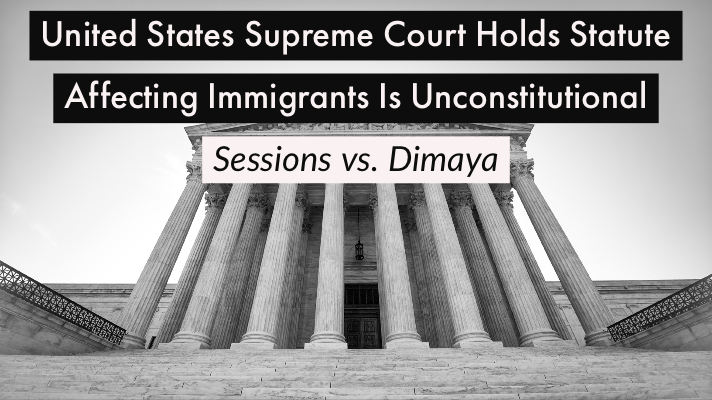
A recent United States Supreme Court case will make it harder for the government to deport a non – United States citizen for being convicted of certain offenses. In Atty Gen’l vs. Dimaya, the Supreme Court found that a provision of the Immigration and Nationality Act was overly broad and unconstitutional, thus rendering convictions for certain offenses no longer subject to removal. In an extension of an already decided Supreme Court case, the Court analyzed 8 U.S.C. §1101(a)(43)(f), which defines an “aggravated felony” to include, among other things, “a crime of violence,” as defined in 18 U.S.C. §16, where a term of imprisonment of one year or more is rendered. The case turned on the definition of a “crime of violence.” Let’s take a look at the Supreme Court’s decision and how it affects immigration law.
What is a crime of violence?
First, we have to know what a “crime of violence” is. Immigration law makes any non-citizen, including longstanding lawful permanent residents (LPRs) deportable if they are convicted of an “aggravated felony.” Among other things, an “aggravated felony” includes a “crime of violence” with a sentence of 1 year or more. So, what is a crime of violence?
A “crime of violence” is defined in 18 U.S.C. §16, as:
(a) an offense that has an element the use, attempted use, or threatened use of physical force against the person or property of another, or
(b) any other offense that is a felony and that, by its nature, involves a substantial risk that physical force against the person or property of another may be used in the course of committing the offense.
This definition doesn’t help us out a whole lot. Especially 16(b). I mean, what is a substantial risk that physical force…may be used? How is a lay person supposed to figure our if a specific state statute involves a substantial risk that physical force may be used? How is a judge supposed to figure that out? This provision is as amorphous as it gets. Is a felony battery conviction included? Is a resisting without violence conviction? Well, the answer you don’t want to hear is that it depends. Ultimately, it is going to be up to the immigration judge to determine whether he or she believes that your state conviction qualifies as a “crime of violence.” And then, you can appeal to higher courts and they can decide as well. We have some appellate authority on some specific statutes, but not on many. Whether your conviction is a “crime of violence,” depends on a number of factors: in which state were you convicted, what is the statutory language, are there appellate decisions that give us guidance.
The Dimaya decision only dealt with §16(b). Convictions that have been determined to be deportable offenses under 18 U.S.C. §16(a) are unaffected by the Dimaya decision.
How did this issue come to be heard by the Supreme Court?
The Dimaya decision was anticipated because the Supreme Court had already struck down an almost identical provision in Johnson v. United States, 576 U.S. ___. In that case, the Supreme Court held that the residual clause in the Armed Career Criminal Act (ACCA) was unconstitutionally broad and therefore was struck down. In Dimaya, the Supreme Court extended that criminal law decision to 18 U.S.C. 16(b), which which is an immigration law provision. In other words, the Johnson case affected people who were charged with crimes and receiving enhanced sentences based on the residual clause of ACCA, while Dimaya affects whether a non – U.S. citizen can be deported based on certain criminal conviction.
How can this decision help me?
If you are not a United States citizen and you are charged, or convicted of a crime, this decision may mean the difference between being deported and not being deported. While the government has relied on 18 U.S.C. §16(b) as a basis to deport people in the past, they will no longer be able to rely on this provision. For example, a robbery conviction may or may not be a “crime of violence,” but it can no longer considered a “crime of violence” under the residual clause. The Supreme Court is currently deciding whether it can be considered a “crime of violence,” in the Armed Career Criminal context, under the elements clause, which is similar to 18 U.S.C. §16(a). So, immigration attorneys around the nation now have a new weapon at their disposal to attack deportations that are based on convictions the government claims are “crimes of violence.”
 Jeremy Lasnetski is a partner at the Law Offices of Lasnetski Gihon Law. The firm focuses on criminal defense, immigration and personal injury. Mr. Lasnetski focuses his practice on immigration and criminal defense. Mr. Lasnetski is the former Jacksonville Regional Vice Chair of the American Immigration Lawyer’s Association, Central Florida Chapter and has represented clients in deportation proceedings, USCIS benefit cases, consular processing cases, and more. He routinely gives presentations on immigration law issues to both criminal and immigration lawyers at conferences and seminars throughout the State of Florida.
Jeremy Lasnetski is a partner at the Law Offices of Lasnetski Gihon Law. The firm focuses on criminal defense, immigration and personal injury. Mr. Lasnetski focuses his practice on immigration and criminal defense. Mr. Lasnetski is the former Jacksonville Regional Vice Chair of the American Immigration Lawyer’s Association, Central Florida Chapter and has represented clients in deportation proceedings, USCIS benefit cases, consular processing cases, and more. He routinely gives presentations on immigration law issues to both criminal and immigration lawyers at conferences and seminars throughout the State of Florida.
 Florida Immigration Lawyer Blog
Florida Immigration Lawyer Blog

